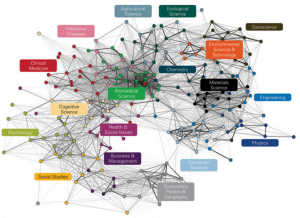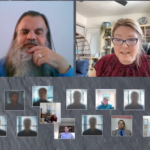In the midst of all the bling of media-rich, adaptive, personalized, [insert-buzzword-here] digital products, there is a lurking underlying problem:
Teaching the same 100-yr old curriculum via innovative digital methods is not solving the real learning problems. #DLNchat #needbetter
— Maria H. Andersen (@busynessgirl) October 11, 2016
The general education curriculum in higher education has barely changed. Today’s world is cross-disciplinary, culturally diverse, and team-oriented. There is almost no problem that can be solved in a silo content area with a team of one.

We need new cross-disciplinary curriculum. We need courses that are more engaging and reflective of today’s real issues. We need courses like these (referenced from my 2009 post on Hacking Higher Education):
- Trend Analysis (Math + History)
- Biology and Human Enhancement (Biology + Philosophy)
- Science of Exercise (Science + Health & PE)
- Exploring Water Issues (Science + Politics)
- Design and Digital Presentations (Graphic Design + Communication)
- Data Analysis and Information Presentation (Statistics, Graphic Design, and Communication)
- Exploring Recycling and Refuse (Science, Government, and Humanities)
- Chemistry of Nutrition (Chemistry + Health & PE)
- Poverty and World Culture (Humanities, Government, and Sociology)
- Sociology and Psychology of the Web (Sociology + Psychology)
- How Computers Think (CIS + Philosophy)
- Art, Media, and Copyright (Fine Arts + Law)
- Writing for the Digital Age (CIS + Communication + English)
- Energy (Physics, Chemistry, and Government)
- Information, Query, and Synthesis (Literacy, Logic, English)
The problem is that very few faculty can teach courses like this without extensive learning or teamwork, and very few authors that could write such a curriculum from scratch.
This is exactly the moment when “digital courseware” should rise to the occasion. Digital courseware could be built to support these kinds of inter-disciplinary courses with a well-designed learning experience (not just text, but formative assessment and designed interactions with students and faculty). It could be multimedia rich, adaptive, personalized, and all that good buzzword stuff.
With a solid digital courseware backbone to support the learning, faculty could be tapped from different disciplines to evaluate work, answer questions, and coach students in their learning. No one faculty member would have to learn all the nuances of the course immediately.
So why aren’t we getting that? Why are we just getting more Algebra, English Comp, and Freshman Biology courses? Because that’s what we keep asking for. We keep saying, “give us better pass rates for these courses we currently teach.” We keep funding the rebuild (and rebuild) of those courses that create retention and graduation pressure in higher education. What if the problem is not the delivery of the course, but in the course itself? What if students are never going to do better in these courses because deep at the heart of the issue, the student knows the course isn’t applicable to the world they live in?
The Big History course (funded by Bill Gates) is an admirable step towards creating a more modern and more interdisciplinary curriculum. MOOCs do not have to pay attention to credit counts, what “department” the course lives in, or how it will or will not count as an elective towards multiple degrees. Consequently, MOOC providers have the freedom to build interesting, modern, and cross-disciplinary courses like The Science of Everyday Thinking (from EdX) or Politics and Economics of International Energy (from Coursera).
But why is it outsiders to education that have to lead these efforts? Educators should begin asking for the “right” curriculum from courseware providers (looking at traditional publishers, digital platforms, and MOOCs). We need to ask for the curriculum we want to teach instead of that which we have always taught.
Of course, courseware providers aren’t going to build something they don’t think has a market yet – and so we have a classic “chicken and egg” problem. This seems like exactly the kind of problem that needs a funding push. If a beautiful digital course on “How Computers Think” or “Poverty and World Culture” became available nationally at a low cost, I’d like to think that institutions and faculty would be able to step up to the challenge of figuring out the rest of the logistics to offer these courses.



